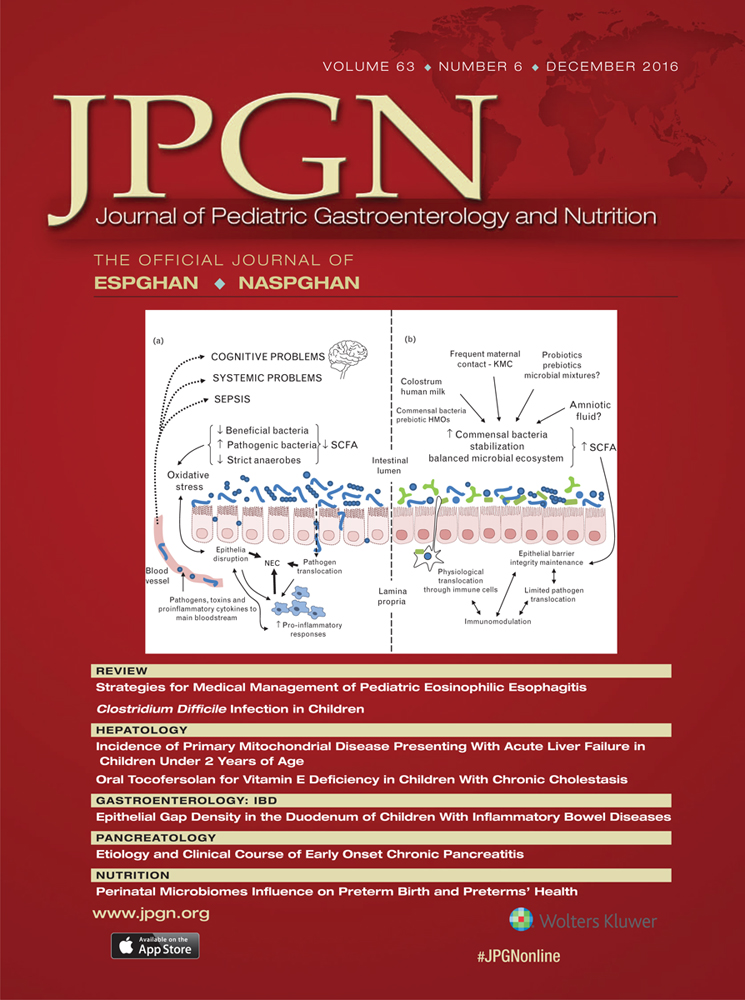Gastrointestinal Symptoms Predictors of Health-Related Quality of Life in Patients With Inflammatory Bowel Disease
Supplemental digital content is available for this article. Direct URL citations appear in the printed text, and links to the digital files are provided in the HTML text of this article on the journal's Web site (www.jpgn.org).
Dr Saeed is now at the Division of Pediatric Gastroenterology, Dayton Children's Hospital, Wright State University, Dayton, OH. Drs Franciosi and Denham are now at the Division of Gastroenterology, Hepatology and Nutrition, Nemours Children's Hospital, Orlando, FL. Dr Saps is now at the Division of Digestive Diseases, Hepatology, and Nutrition, Nationwide Children's Hospital, Ohio State University, Columbus, OH. Dr Zacur is now at the Division of Pediatric Gastroenterology, C.S. Mott Children's Hospital, University of Michigan, Ann Arbor, MI. Dr Vaughan Dark is now at the Division of Pediatric Pulmonology, Children's Medical Center, Dallas, TX.
Item development for the PedsQL Gastrointestinal Symptoms Module was previously supported by Takeda Pharmaceuticals North America, Inc. Data collection for the healthy controls sample was supported by intramural funding from the Texas A&M University Dr Varni holds the copyright and the trademark for the PedsQL and receives financial compensation from the Mapi Research Trust, which is a nonprofit research institute that charges distribution fees to for-profit companies that use the Pediatric Quality of Life Inventory. Dr Varni received investigator-initiated funding from Takeda Pharmaceuticals North America, Inc. (Deerfield, IL) for the previous item generation qualitative methods study. Dr Pohl received investigator-initiated funding from Takeda Pharmaceuticals North America, Inc. (Deerfield, IL) for the previous item generation qualitative methods study. Drs Varni and Pohl did not receive funding from Takeda Pharmaceuticals North America, Inc. for the current quantitative methods field test study. Dr Pohl has received the following funding: INSPPIRE to Study Acute Recurrent and Chronic Pancreatitis is Children, grant 10987759, National Institutes of Health (NIH), National Institute of Diabetes and Digestive and Kidney Diseases. Dr Pohl is on the speaker's bureau for Medical Education Resources, Inc. Dr Saeed is on the speaker's bureau for Abbvie, Inc. Dr Shulman is supported by NIH grants R01 NR013497 and T32 DK007664 and receives research funding from Mead-Johnson and is a consultant for Nutrinia. Dr Nurko is supported by NIH grant K24DK082792A. Dr Franciosi is supported by PCORI: R-1306-01556 and Department of Defense W81XWH-13-1-0316. These grants are not related to the present study. The other authors report no conflicts interests related to this study.
A list of the Pediatric Quality of Life Inventory Gastrointestinal Symptoms Module Testing Study Consortium sites is contained in the Appendix.
ABSTRACT
Objectives:
The aim of the study was to investigate the multidimensional gastrointestinal symptoms predictors of generic health-related quality of life (HRQOL) in pediatric patients with inflammatory bowel disease from the perspectives of pediatric patients and parents.
Methods:
The Pediatric Quality of Life Inventory Gastrointestinal Symptoms Scales and Pediatric Quality of Life Inventory 4.0 Generic Core Scales were completed in a 9-site study by 260 families of patients with inflammatory bowel disease. Gastrointestinal Symptoms Scales measuring stomach pain, food and drink limits, gas and bloating, constipation, blood in stool, and diarrhea were identified as clinically important symptom differentiators from healthy controls based on prior findings, and subsequently tested for bivariate and multivariate linear associations with overall HRQOL (Generic Core Scales).
Results:
Stomach pain, food and drink limits, gas and bloating, constipation, blood in stool, and diarrhea were significantly associated with decreased HRQOL in bivariate analyses (P < 0.001). In predictive models utilizing hierarchical multiple regression analyses controlling for age, sex, and race/ethnicity, gastrointestinal symptoms accounted for an additional 40% of the variance in patient self-reported HRQOL (P < 0.001) and 37% of the variance in parent proxy-reported HRQOL (P < 0.001), reflecting large effect sizes. Stomach pain, food and drink limits, and constipation were significant individual patient-reported predictors after controlling for the other gastrointestinal symptoms in the predictive models.
Conclusions:
Patient-reported gastrointestinal symptoms differentially predicted HRQOL. Identifying the specific gastrointestinal symptoms from a standardized multidimensional gastrointestinal symptoms profile that are the most important predictors from the patient perspective facilitates a patient-centered approach for interventions designed to ameliorate impaired HRQOL.




